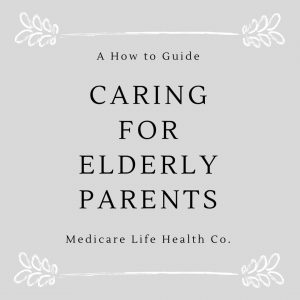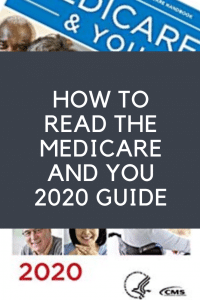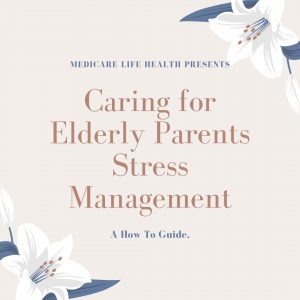Caring for Elderly Parents: A How To Guide

Welcome to the ultimate guide to caring for elderly parents and/or grandparents. Aging is a natural part of life, and everyone should have a care plan for themselves and their aging loved ones. This guide helps you make the tough decisions to keep your loved ones safe and happy.
I personally know what it is like to live with elderly loved ones and care for them. I lived with my grandparents right before their health declined enough to move them to assisted living. It was the hardest year of my life. However, it was also rewarding to care for them after all of the years they cared for me.
This guide leads you through the decisions you will need to consider to help your elderly parents.
We will cover:
- Where can my aging parents/grandparents safely live?
- What services and products can keep them safe and happy?
- How can I help them with health care and insurance?
- Who should be in charge of their finances?
- Where can I go for support?
Where can my loved ones safely live?

Helping your elderly parents or grandparents decide where they should live can be very emotional. This is true for all the people involved. The options range from staying at home to full-time care, and everything in between.
Senior Living Options
- Living at Home – Options exist for helping your seniors live at home as long as possible.
- There are non-medical care-giving services such as Home Instead and Right at Home. They provide help around the house and companionship, but not medical care.
- The medical alert devices listed in the services in the next section also help give seniors and you peace of mind in regards to their safety. These are good for the home environment, as well as running around town.
- Retirement Community / Apartment or Condo – Often times seniors will want to move to a retirement community or 55+ apartment or condo building. Seniors like the social aspects of these communities. In addition, there are add conveniences and informal safety networks in place to give everyone peace of mind.
- Assisted Living – For seniors that need a level of care below the nursing home, assisted living is a great option. However, these homes can be expensive. There are not always spots open for low income or Medicaid beneficiaries.
- Memory Care Centers – Dementia and Alzheimer’s is a growing disease in America. As a result, we see more centers and homes dedicated to residents with memory issues.
- Nursing Homes and Long-Term Care – The last stop on the list is the nursing home / long-term care facilities. There are both private and public options in most cities, but it takes a lot of research to make sure you are finding the best fit for your loved one.
- The government has a web-page to help you in comparing nursing home quality here.
What services / products can keep elderly loved ones safe and happy?
Especially if your loved ones are living at home, there are different products and services that can give everyone peace of mind. These include aides to help with daily activities, as well as alert / check-in services.
Products to Keep Your Loved Ones Safe & Happy
We love products that keep seniors happy, independent and safe. Happily, more creative and innovative options exist that ever to make life easier. We are constantly on the hunt for life-improving and safety-enhancing innovations.
For now, you can start by looking at our senior gift lists.
We love the idea of thoughtful and helpful house warming gifts for seniors that are making a move. Especially if this move was out of necessity. A little love and thought goes a long way with these big transitions.
Services to Keep Your Elderly Parents Safe
We all worry about falls and accidents. The elderly often experience a decline in balance and strength with each passing year. There are a few options out there of companies that will monitor your loved ones and give them the help they need in case of a fall. When we look at companies to refer you to, we look for ones with good customer service, customization options and no long-term contracts.
Here are our Top Senior Monitoring Picks:
- MobileHelp – Provides an alert system that works with a “Fall Button” that can automatically detect when a fall occurs. This company gets almost 5/5 stars in most consumer review panels. Learn more here.
- LifeFone – Is our other top pick for Medical Alert Systems. It also is rated very highly and offers a free trial period. Spouses are also included in their standard pricing, which makes it a good choice for couples.
- Iamfine – As a different kind of monitoring service, Iamfine is a daily call service that checks in with your loved ones by phone. If they fail to answer after a few attempts, Iamfine will alert your “care circle.” The service has a free 2 week trial period as well.
How can I help elderly parents with health care and insurance?
If your loved one is either older than 65 or disabled, they probably qualify for the Medicare program. In addition, if they are living on a very small income, they could also qualify for Medicaid.
From a high level view, your loved one will need to choose if they want their Medicare coverage to be bundled with a Medicare Advantage Plan or to be put together with Original Medicare, a Supplement and a Drug Plan. These are the two paths to choose from.
Let’s back up now, and break down the parts of Medicare. We want you, the caregiver, to feel as comfortable and knowledgeable as possible when helping your seniors make their decisions.
Helpful Medicare Articles for Caregivers
MedicareLifeHealth.com is a great resource for learning about Medicare. We have articles to show you how to set-up your loved one’s health care. We understand it is so important to make sure they get the coverage and care they need.
Here is where to go for more information:
- What is Medicare? (If you need to start with the basics!)
- What is Medicare Advantage? (The bundled option, aka Part C.)
- What is a Medicare Supplement Plan? (Aka Medigap or Gap Plan.)
- How does my loved one get a Prescription Drug Plan? (Part D as either a stand alone plan or part of a Medicare Advantage Bundled Plan.)
- What option is best for my loved one – Medicare Advantage or Original Medicare with a Supplement?
- If you have more specific Medicare Questions, we suggest reading our Medicare and You User Guide. The US government publishes a Medicare and You Book each year that goes into detail about Medicare. It is usually over 120 pages. Thus, many people are overwhelmed by it. However, it is a good resources. So we created a User Guide to help you understand Medicare better and locate the answers you need for very specific questions.
Who can I call or email for help with Medicare/Medicaid/Health Care Insurance?
MedicareLifeHealth is a national community, but health care questions and registrations are often different state to state. So, we have a couple different resources for you to work with.
If you live in Nebraska or Iowa: Your fearless leader of Medicare Life Health Co. (Carly Cummings – that’s me!) is a licensed life/health agent in NE and IA. I would be glad to help you with your questions and enrollment needs.
If you live in all other 48 States: We are building our directory of national insurance agents. Find one now:
Who should be in charge of caring for elderly parents’ finances?
There might come a time when you realize your seniors need help with their finances. As a result, you will discover two phases of caring for your elderly parents’ or grandparents’ finances:
- Assisting with their decisions.
- Taking over the decisions.
This same process translates to Medical decisions, so we will include information on both.
Durable Power of Attorney
When working with seniors to help them in making financial and medical decisions, you will want to set up “Durable” Power of Attorney (POA). This is a document that will give you (or someone else they trust) power to act in their place if they become mentally incapacitated.
The “Durable” part is important. Regular power of attorney documents end when a person becomes mentally incapacitated. Durable powers of attorney contracts do not. With this document, you will be able to help your elderly parent with important decisions when they cannot.
In addition, you will want to have two separate Durable Power of Attorney Documents:
- One for Medical
- And one for Financial.
Medical Power of Attorney (POA)
Commonly called the durable power of attorney for health care, this document names the person who will be making health care decisions for your elderly parent.
The named person will be able to enroll the elderly parent in medical plans, speak to doctors on their behalf, and represent their wishes in regards to medical care.
You will also want to make sure your loved ones have a living will and a regular will. Knowing your loved one’s desires for how end of life care and services will go is very important. Please see our full article on “Caring for Dying Parents” here.
Financial Power of Attorney (POA)
Your elderly family member will also need to name someone to carry out their financial wishes when they cannot. This is where a comprehensive durable financial power of attorney is important.
Note, this should be a separate document from the medical POA. The financial POA allows someone take over your elder’s retirement accounts, taxes, and bills. For this reason, it needs to be someone they trust, and should be done as soon as possible to make sure they are represented in the ways they wish.
Working Together
Finally, although these are two separate documents, you certainly can name the same person on both. In fact, having the same person do both will make life much easier and simpler. If you do have different people named on each document, you will want to ensure they communicate well and can work together effectively.
Where can I get support for caring for elderly parents?
I remember pulling over to the side of the road, one very stressful day, because I couldn’t see through my tears to drive. At the time, I was living with my grandparents and trying to care for them while their health continued to decline.
I was overwhelmed by the amount of work it took to keep them safe in their own home (even with the help of a home care company). Consequently, we were reaching the tipping point of needing to move them to assisted living. However, the thoughts about and process of this change were also just sad. It was a lot for me to handle.
Luckily, I had a very strong support system and access to help. You need this too. You can start by reading this article on managing caregiver stress and preventing burnout.
Find Someone to Talk to Regularly
The first step is to reach out to someone to talk to and confide in. Care-giving takes a lot out of you. As a result, you need someone to listen to you and give back to you. Whether this is a professional counselor, or just a friend, you need to make “talking it out” a priority. Better yet, make your conversations a habit or a standing date.
Seek Outside Help
The second step is to get outside help. If your parent is still at home, see what is in the budget for hiring a care service. Even if just for a few hours a week. These companies help with daily living activities for seniors wanting to still live by themselves. (This is non-medical help.)
Alternatively, you can see what social network your seniors are a part of that might want to help. My mom was excellent at getting visitors for her elderly parents from not only their friends, church member, etc. but also from her own social network. You would be amazed at how many people are willing to swing by a nursing home and say hello during the week. You just have to ask!
Set-up Self-Care
Care-giving makes you busy, tired and often plain run-down. The only way self-care happens is when you make it a priority. Moreover, you need to set it in your schedule as an important appointment.
First, create and stick to a weekly workout schedule. Then, create a routine for getting healthy meals onto your table. Finally, make sure you keep your hair appointments, massages or other healthy ways to relax and stay on top of your health.
I know it is all easier said than done, but you will be much more efficient and helpful if you are well rested and cared for first.
Action Steps for Caring for Elderly Parents

In summary, caring for elderly parents, grandparent and loved ones is a long, hard journey. However, you are not alone! In addition to all the helpful organizations, services and innovations out there, there are also real people that want to love and support you. You cannot, and should not, do this alone.
Here are a few good steps to get you started or move you forward with your loved one’s journey.
- First, if you are considering housing options, reach out to a home care service. If a move is a necessity sooner or later, start by touring one assisted living center or nursing home.
- Second, for seniors living at home or even in assisted living, look into a couple of medical alert systems. Falls are all too common, and you need to be prepared.
- Third, in regards to health care, reach out to a professional to make sure your loved one has the best coverage in their area. Plans change all the time, so a review is always a good idea.
- Fourth, legally, make sure you understand what your loved one needs and wants in regards to making financial decisions. Get together all the proper documents needed to secure current or future Power of Attorney options.
- See in your loved one has any Long-Term Care Insurance in place. Additionally, they could have a life insurance policy with a Long-Term Care Rider or a Critical Illness Rider.
- Finally, create a plan now for taking care of yourself and start implementing it right away. You deserve it. Thank you for taking care of your elderly parents and loved ones.














5 thoughts on “Caring for Elderly Parents”